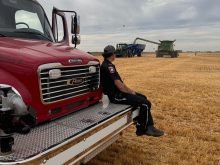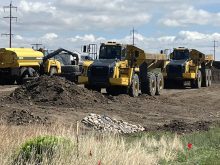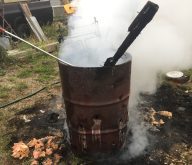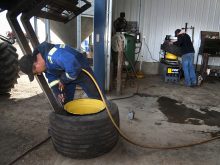RED DEER — Farmers need to be part of the discussion on farm safety rules or rules will be forced on them, says the vice-president of Keystone Agricultural Producers.
In 2009, it became mandatory for Manitoba farmers to take out Workers Compensation Board coverage for their farm employees. However, only 1,500 of the province’s 10,000 farms have done so.
Dan Mazier said farmers need to take a close look at such coverage for their employees and contractors or hope they never have an accident on their farm.
“Why would you want to work at a place that had no insurance?”
Read Also

Farming Smarter receives financial boost from Alberta government for potato research
Farming Smarter near Lethbridge got a boost to its research equipment, thanks to the Alberta government’s increase in funding for research associations.
Mazier said he learned to farm on a 35-horsepower tractor pulling a 12-foot drill that was loaded with sacks of seed by hand. Arms and legs weren’t in much danger from the four or six inch auger because it would likely stall before it did much damage.
However, today’s farm equipment is different. No one stands a chance in an accident with a 350 h.p. tractor or a 15-inch auger.
Mazier said farmers need to forget about what it was like when they grew up on the farm, and instead do what’s necessary to prevent farm accidents.
“It is a no brainer to have WCB on our farm,” said Mazier.
KAP has started an awareness campaign to help farmers develop a mandatory farm safety orientation plan for new employees.
“Farmers don’t realize they need to do that,” he said. “It is the law of the land, just like wearing seat belts.”
Herman Schwenk of Coronation, Alta., worries that tough oil patch workplace regulations will soon be mandatory on Alberta farms.
Schwenk believes excessive safety regulations are partly to blame for the slowdown in the oil and gas industry.
“I can see that happening with agriculture,” he said.
“Bureaucrats like creating more jobs for more bureaucrats, and that takes away from productivity.”
However, Mazier said statistics prove that farms are a dangerous place, and farmers need to recognize the dangers. Sixteen farm fatalities occurred in Manitoba from 2000-12.
“How can we defend what we’re doing on our farms?” he said.
Farmers need to help make the rules instead of ignoring them, he added.
Todd Lewis, vice-president of the Agricultural Producers Association of Saskatchewan, said farmers shouldn’t ignore the opportunity to talk about farm safety with government officials.
“Farmers are being given an opportunity to do some planning, and we better take it or we’ll end up left out in the field,” he said.
“If we don’t get involved, someone is going to tell us what to do.”
Lynn Jacobson, president of the Alberta Federation of Agriculture, said Workers Compensation Board coverage is a risk management tool that farmers can use to protect their farm.
“If a truck driver or worker gets hurt on your farm, you’re liable. We have to be part of the conversation.”
Jacobson said an elderly neighbour was killed recently when the ladder he put inside a front-end loader slipped out of the bucket while he was attempting to reach the top of a grain bin.
Farmers should be proactive by adding safety equipment such as ladders to grain bins to protect themselves and their workers, he added.
“A $300 add to a bin would probably have saved a life. It doesn’t cost much to add safety equipment to our equipment. We want to be part of the conversation and part of the group that makes the rules.”
Contact mary.macarthur@producer.com
















